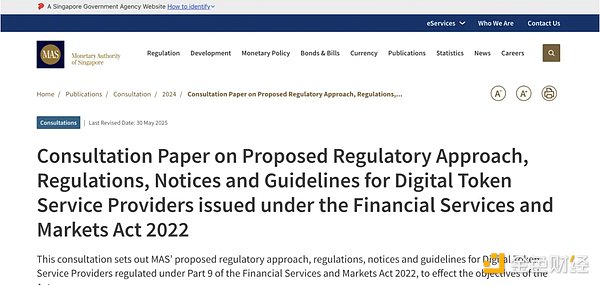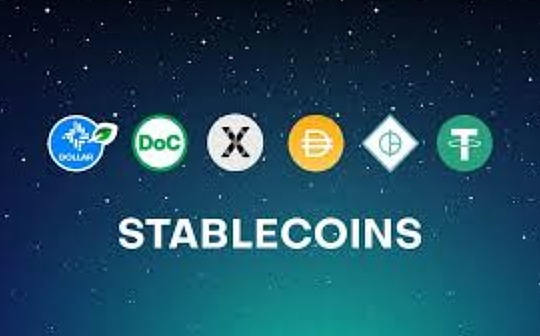The end of the regulatory arbitrage era in Singapore

Reprinted from jinse
06/05/2025·15DSource: Encrypted fat cat Dazhuang official account The Monetary Authority of Singapore (MAS) dropped a big bomb on May 30, 2025 and issued a response document to the new regulations of DTSP (digital token service provider). It officially started on June 30, and there was no buffer period at all! This wave of operations directly caused the entire Asian Web3 circle to explode, and many people have not yet reacted. This policy may completely change the industry structure. Simply put, Singapore is going to "bomb out" all unlicensed Web3 players. The former "Asian Crypto Paradise" may be said bye bye!
Once Glory: The Paradise of Web3
Looking back on 2021, Singapore was the "dream place" of Web3 entrepreneurs. China has banned cryptocurrencies, the US SEC is looking for trouble everywhere, but Singapore has opened its doors to welcome everyone. Big players like Three Arrows Capital, Alameda Research, and FTX Asia Headquarters all came here to settle down. Why? The 0% capital gains tax, coupled with MAS's attitude of "embracing innovation" at that time, is simply a treasure land for regulatory arbitrage! Registering a company in Singapore can serve global users legally and compliantly, and can also rely on the Singapore Financial Center's signature. Web3 practitioners are trying to come up with it.
The new regulations are here: No license? Don 't want to get stuck here!
Now, MAS has turned its back on the scene, and the new DTSP regulations have slammed the regulatory door. The core sentence is just one sentence: If you don’t have a license, no matter who you are, don’t think about starting a digital token business in Singapore!
What is DTSP? Simply put, it is any service provider related to digital tokens (such as cryptocurrencies), divided into two categories:
Individuals or companies that have “business premises” in Singapore;
Companies registered in Singapore, even if their business is overseas.
This definition sounds simple, but the word "business place" can hide a knife! MAS said the business premises are “any location used to conduct business”, including mobile places like roadside stalls! In other words, as long as you are doing business related to digital tokens anywhere in Singapore (even at home sofa), it is illegal to have no license! Whether you are serving local or overseas customers, you must abide by this rule.
Is working from home considered illegal?
This problem has made many people feel nervous. Baker McKenzie Law Firm specifically asked MAS: "Remote work is so common now. Is it a violation to work for overseas companies at home?" MAS's answer is quite cold: If you provide digital token services to overseas customers anywhere in Singapore (including at home), you have to apply for one if you don't have a license! However, they also left a small gap: If you are an employee of an overseas company and simply work from home, it is your boss's business, and you don't have to apply for a license personally. But if you work in a shared office space or someone else's office, you may be caught. The question is: Who is considered an "employee"? Does the founder count? Does the holdings count? MAS has the final say, it is so vague that it makes people crazy!
Can 't even run away from KOL?
What’s even more exaggerated is that MAS’ definition of “digital token service” is ridiculously wide, and even publishing research reports and writing analysis articles may be included! For example, you are a KOL and posted a post in Singapore to analyze the investment value of a certain token. In theory, it may be illegal if you don’t have a license!
Blockchain Association of Singapore directly asked MAS: "Does traditional research reports count? How to distinguish them?" MAS did not give a clear answer, which made the content creators tremble.
Who is the most dangerous?
The following groups should be careful about this new rule:
Individuals: independent developers, project consultants, market makers, miners, KOLs, community operations, project founders, BDs, sales... can't escape.
Institutions: Unlicensed exchanges (CEX, DEX), DeFi projects, NFT platforms, and crypto wallets are all at high risk.
Conclusion: Singapore 's "regulatory arbitrage" era is over
MAS is serious this time, and it is clear that it wants to clear out all non- compliant Web3 players. What are the luxurious offices and sofas at home? As long as they are related to digital tokens, you don’t have a license. Moreover, the definitions of "business premises" and "business behavior" are vague, and MAS is likely to first capture a few typical examples of "killing the chicken to scare the monkey".
Want to cram the license temporarily? Disaster! MAS said that the license approval is "extremely cautious" and there is basically no chance. Singapore's Web3 golden age has completely cold, and next is the game of big fish eating small fish. What the project parties and institutions now think about is not "stay or not", but "when to withdraw" and "where to go".
To summarize:
Singapore has changed from a "friendly paradise" of Web3 to a "regulatory iron fist". The new regulations will take effect on June 30. Those who do not have a license should not be able to get stuck here. Even KOLs may step on the wrong side if they post an analysis post. Working from home may have exemptions, but the definition is vague and MAS has the final say. Web3 players, think about the way out!
Source:
https://www.mas.gov.sg/publications/consults/2024/consult-paper-dtsp


 chaincatcher
chaincatcher

